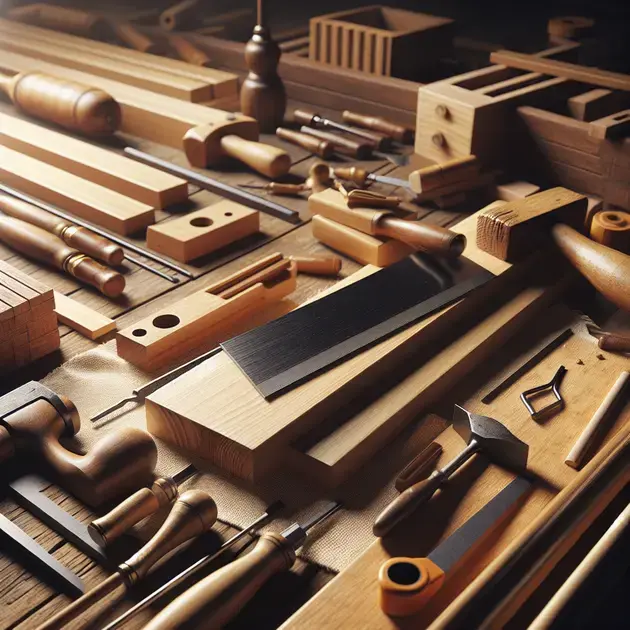Mastering the Art of Woodworking requires attention to detail, precision, and a deep understanding of the materials involved. With the rise of DIY culture and sustainability trends, woodworking has experienced a resurgence in popularity in recent years.
Whether you’re a seasoned woodworker looking to refine your skills or a beginner eager to learn the ropes, this blog post will provide valuable insights and tips to help you hone your craft. From selecting the right tools to mastering intricate techniques, we’ll guide you on your journey to becoming a woodworking master.

“`html
Tips for Perfecting Your Woodworking Craft
Woodworking requires a combination of skill, creativity, and precision to achieve the best results. Here are some tips to help you perfect your woodworking craft:
1. Practice Proper Safety Measures
Always wear safety goggles, a dust mask, and ear protection when working with power tools. Keep your work area well-lit and organized to avoid accidents. Apps like Woodcraft (www.woodcraft.com) offer safety tips for woodworkers of all levels.
2. Learn from Master Craftsmen
Take online courses from experts on platforms like Udemy (www.udemy.com) to learn advanced woodworking techniques. Watching woodworking videos on YouTube channels like Woodworking For Mere Mortals can also provide valuable insights.
3. Invest in Quality Tools
High-quality tools make a significant difference in the precision and finish of your woodworking projects. Websites like Woodpeckers (www.woodpeck.com) offer a wide selection of premium woodworking tools for all skill levels.
4. Experiment with Different Woods
Each type of wood has unique characteristics that affect how it can be shaped and finished. Try working with a variety of woods to understand their properties better. The Wood Database (www.wood-database.com) is a great resource for learning about different wood species.
5. Patience and Persistence
Woodworking is a skill that takes time to master. Be patient with yourself and keep practicing to improve your craftsmanship. Apps like Woodworking Masterclass (www.woodworking-masterclass.com) offer step-by-step guides for various woodworking projects to help you hone your skills.
Mastering Advanced Woodworking Techniques
Once you have honed your basic woodworking skills, it’s time to delve into more advanced techniques to take your craftsmanship to the next level. Here are some steps to help you master advanced woodworking techniques:
1. Learn Joinery Methods
Study and practice different joinery methods like dovetail joints, mortise and tenon joints, and finger joints. Websites like Fine Woodworking (www.finewoodworking.com) offer detailed tutorials on advanced joinery techniques.
2. Explore Sculpting and Carving
Experiment with sculpting and carving techniques to add intricate details to your woodworking projects. Apps like Carveco Maker (www.carveco.com) provide digital sculpting tools for woodworking enthusiasts.
3. Master Wood Finishing
Understanding different wood finishes like varnish, stain, and oil can enhance the appearance and durability of your projects. Websites like Woodworkers Source (www.woodworkerssource.com) offer guides on choosing the right finish for your woodworking creations.
4. Build Complex Furniture Pieces
Challenge yourself by constructing complex furniture pieces like cabinets, tables, or chairs. Platforms like Popular Woodworking (www.popularwoodworking.com) provide plans and instructions for building advanced furniture designs.
5. Collaborate with Other Woodworkers
Join woodworking communities or workshops to collaborate with experienced woodworkers and learn from their expertise. Platforms like Woodworking Talk (www.woodworkingtalk.com) provide forums for sharing ideas and getting feedback on your projects.
Essential Tools for Woodworking Success
Having the right tools is essential for achieving success in woodworking. Here are some must-have tools for every woodworker:
1. Circular Saw
A circular saw is versatile for making straight cuts in various wood materials. Brands like DEWALT and Makita offer reliable circular saws for woodworking projects.
2. Chisels and Mallet
Chisels and a mallet are essential for carving and shaping wood. Quality chisels from Narex or Stanley ensure precision in your woodworking tasks.
3. Clamps
Clamps are crucial for holding pieces of wood together securely while glue dries. Bessey and Irwin are reputable brands known for their durable woodworking clamps.
4. Router
A router is handy for creating intricate designs, edges, and joinery in wood. Bosch and Porter-Cable are trusted brands offering reliable woodworking routers.
5. Measuring Tools
Accurate measurements are key in woodworking, so invest in quality measuring tools like a tape measure, a combination square, and a marking gauge from companies like Starrett or Woodpeckers.
“`

Improving Your Woodworking Skills
Woodworking is a craft that requires patience, precision, and dedication. Whether you’re a beginner or an experienced woodworker, there are always ways to improve your skills and take your craft to the next level. Here are some tips to help you enhance your woodworking abilities:
1. Learn from Experts
One of the best ways to improve your woodworking skills is to learn from experts in the field. Take woodworking classes, attend workshops, or watch online tutorials from seasoned woodworkers. By studying their techniques and listening to their advice, you can gain valuable insights and improve your own craftsmanship.
2. Practice Regularly
Like any skill, woodworking requires practice to master. Set aside dedicated time each week to work on woodworking projects. The more you practice, the more comfortable you will become with different tools and techniques. Don’t be afraid to make mistakes – learning from them is a crucial part of the improvement process.
3. Invest in Quality Tools
Quality tools are essential for woodworking success. Invest in high-quality chisels, saws, drills, and other essential woodworking tools to ensure precision and efficiency in your projects. Well-maintained tools not only improve the quality of your work but also make the woodworking process more enjoyable.
4. Experiment with New Techniques
Don’t be afraid to step out of your comfort zone and experiment with new woodworking techniques. Try your hand at intricate joinery, wood carving, or woodturning to broaden your skill set and challenge yourself. The more techniques you master, the more versatile and accomplished woodworker you will become.
5. Seek Feedback
Solicit feedback from other woodworkers, friends, and family members on your woodworking projects. Constructive criticism can help you identify areas for improvement and provide valuable insights for enhancing your skills. Embrace feedback as an opportunity to grow and refine your woodworking abilities.
Top Secrets for Mastering Woodworking
Mastering woodworking requires a combination of skill, knowledge, and patience. To truly excel in this craft, you must be willing to invest time and effort into honing your abilities. Here are some top secrets for mastering woodworking:
1. Develop a Detailed Plan
Before starting any woodworking project, take the time to develop a detailed plan. Sketch out your design, create a materials list, and map out each step of the construction process. Having a clear plan in place will help you stay organized, focused, and avoid costly mistakes along the way.
2. Choose the Right Wood
The type of wood you use can significantly impact the outcome of your woodworking projects. Experiment with different wood species to understand their unique characteristics and how they interact with various tools and finishes. Selecting the right wood for each project is essential for achieving professional-looking results.
3. Master Joinery Techniques
Strong and precise joinery is the hallmark of expert woodworking. Take the time to master classic joinery techniques such as dovetail joints, mortise and tenon joints, and box joints. Practice these techniques until you can execute them flawlessly, as they are crucial for creating durable and visually appealing woodwork.
4. Focus on Finishing Touches
Attention to detail is what sets master woodworkers apart from amateurs. Pay close attention to the finishing touches of your projects, such as sanding, staining, and applying a protective finish. A well-executed finish can enhance the beauty of the wood and provide long-lasting protection against wear and tear.
5. Continuously Learn and Improve
Woodworking is a lifelong learning journey. Stay curious, seek out new challenges, and continually strive to improve your skills. Attend woodworking seminars, read books and magazines on the subject, and network with other woodworkers to exchange ideas and knowledge. The more you learn, the more mastery you will achieve in woodworking.
Must-Have Equipment for Crafting Success
Having the right tools and equipment is essential for achieving success in woodworking. Whether you’re a beginner or a seasoned woodworker, investing in quality tools can significantly impact the quality and efficiency of your projects. Here are some must-have equipment for crafting success:
1. Table Saw
A table saw is a versatile and indispensable tool for any woodworker. It allows you to make precise cuts, rip boards, and create a wide range of joinery. When selecting a table saw, choose one with a powerful motor, stable base, and adjustable settings for maximum versatility.
2. Router
A router is essential for shaping edges, creating grooves, and cutting intricate designs in wood. Invest in a quality router with variable speed control, ergonomic handles, and a variety of bits for different woodworking applications. A router can add decorative details and professional-looking finishes to your projects.
3. Clamps
Clamps are essential for holding wood pieces securely in place during gluing, assembly, and clamping. Stock up on a variety of clamps, including bar clamps, pipe clamps, and spring clamps, to accommodate different project sizes and shapes. Proper clamping ensures precise and stable construction of your woodworking projects.
4. Random Orbital Sander
A random orbital sander is a must-have tool for achieving smooth and polished finishes on your wood projects. Look for a sander with variable speed control, dust collection system, and ergonomic design for comfortable handling. Sanding is a crucial step in woodworking, and a quality sander makes the process more efficient and effective.
5. Safety Gear
Protecting yourself is paramount in woodworking. Invest in essential safety gear such as safety goggles, ear protection, dust masks, and gloves to prevent injuries and health hazards during woodworking. Prioritize safety in your workshop to ensure a safe and enjoyable crafting experience.
Conclusion
Enhancing your woodworking skills is a journey that requires dedication and continuous improvement. Learning from experts, practicing regularly, and investing in quality tools are essential steps to take your craft to the next level. By experimenting with new techniques and seeking feedback, you can refine your skills and broaden your woodworking abilities.
Developing a detailed plan, selecting the right wood, mastering joinery techniques, focusing on finishing touches, and continuously learning and improving are the top secrets to mastering woodworking. These techniques, when combined with patience and persistence, will help you excel in this intricate craft.
Equipping yourself with must-have tools such as a table saw, router, clamps, random orbital sander, and essential safety gear is crucial for achieving success in woodworking. Prioritizing safety and efficiency in your projects will not only enhance the quality of your work but also ensure a safe and enjoyable crafting experience.